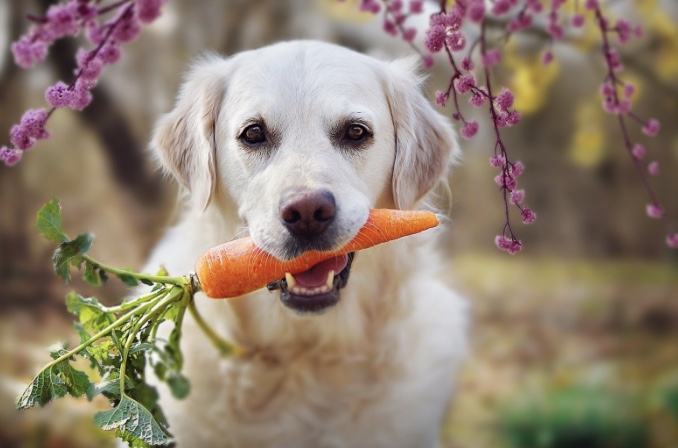Easter treats are a favourite across the UK, but some of these festive goodies can be harmful to pets, with an estimated 7.1 million falling ill each year after consuming toxic substances. Around Easter, concern among pet owners spikes, with searches for dog and cat poisoning symptoms increasing by 90% and 80%respectively over the past month.
To help you celebrate without any unwanted scares, Digital PR Agency has created a helpful guide on which Easter foods to avoid, the symptoms to watch out for, and tips to keep your pets safe.

The most toxic Easter foods to keep away from pets
Chocolate eggs or chocolate bunnies
Chocolate is toxic to all pets, especially dogs, cats, and rabbits. It contains theobromine, a compound that animals can’t metabolise properly. Even small amounts can lead to vomiting, seizures and heart issues.
As a pet-safe alternative, make your own “pet-friendly chocolate” at home using plain Greek yoghurt (unsweetened) with a dash of xylitol-free peanut butter or carob powder – a superfood with a chocolatey taste safe for dogs, rabbits, guinea pigs and some rodents.
Be careful with cats and skip the sweet-style substitutes. They don’t crave sugar or chocolate and many dairy based alternatives (like yoghurt) can upset their stomachs.
Hot cross buns
A classic Easter bake, hot cross buns often include raisins, sultanas or currants, which are highly toxic to dogs, cats and rabbits. These dried fruits can lead to kidney failure and digestive upset. While some pets, like horses or turtles, might tolerate tiny amounts as an occasional treat, it’s best avoided due to the high sugar and spice content.
If you want your pet to enjoy the Easter spirit, try baking plain buns with pet-safe ingredients like oat or whole wheat flour and using safe fruits like blueberries or grated apple. When unsure how the treat was made, always play it safe and skip it.
Simnel cake
Traditional Simnel cake and other Easter bakes usually contain raisins, alcohol, and rich spices, all of which can be dangerous for pets. Raisins can lead to kidney failure, while alcohol may cause vomiting, disorientation and seizures.
Instead, whip up a pet-safe cake using wholemeal, oat or almond flour. Naturally sweeten with pet-friendly fruits like bananas or blueberries. For extra flavour and fibre, mix in xylitol-free peanut butter, pumpkin purée or grated carrot and finish with plain yoghurt as frosting.
Roast ham
While ham might be a delicious Easter dish for humans, it’s too fatty for pets and can lead to pancreatitis. The seasonings often contain garlic and onion, both highly toxic to most pets. For pets that aren’t herbivores, it’s safer to serve plain cooked chicken or turkey. Avoid fatty cuts and any seasoning, as even small amounts of salt or seasonings can cause harm.
Easter biscuits
Easter biscuits are often flavoured with spices like nutmeg and cloves, both of which are toxic to most pets. These spices can cause vomiting, lethargy and organ damage. As a safer alternative, homemade pet-safe biscuits made from oats, pumpkin and peanut butter make for great treats, especially for dogs and rabbits. Once again, avoid any sweet-style treats for cats.
Easter pie
Easter pies typically include dangerous ingredients like raisins, alcohol, and rich fats. Alcohol can cause breathing problems and seizures, while raisins can lead to organ failure.
For a safer option, consider making a pet-friendly pie or treat using ingredients like sweet potato or plain chicken without seasoning.
Pretzels
Though not traditionally Easter themed, pretzels often make their way into snack bowls during seasonal gatherings. However, they’re high in salt, which can lead to vomiting, dehydration and sodium poisoningin pets. The refined carbs offer little nutritional value and may disrupt digestion.
Instead, go for other festive and crunchy options like carrot sticks. They’re fun to eat and packed with fibre. Just keep in mind that rabbits, horses and guinea pigs should only enjoy carrots occasionally due to their sugar content.
It’s not just food! Keep decorations pet-safe too
Easter decorations may look cute, but some are just as risky as treats. Curious pets can ingest harmful Easter themed decorations like plastic grass, jelly beans and scented candles. Plastic can cause internal blockages, while sugary sweets often contain xylitol, which is toxic to pets.
Scented candles may release harmful fumes, and flowers like lilies and daffodils are highly poisonous, especially to cats. Choose safer options like shredded paper, unscented soy candles, pet-friendly treats, and non-toxic flowers like roses.
🐾 Expert tips to keep your pet safe this Easter
- Keep food and decorations out of reach: Store all food and decorations safely away from your pet’s reach and keep bins securely closed.
- Check ingredients: Always double-check ingredients of treats before giving them to your pet.
- Inform guests: Make sure your guests know what your pet can and can’t eat.
- Recognise signs of toxicity: Familiarise yourself with symptoms like vomiting, diarrhea, lethargy or seizures. If your pet shows any signs of poisoning, seek medical help immediately.
- Contact your vet: If your pet eats something toxic, call your vet immediately for advice.
- Emergency poison helplines: Keep the number of a pet poison helpline handy for urgent situations.
–



